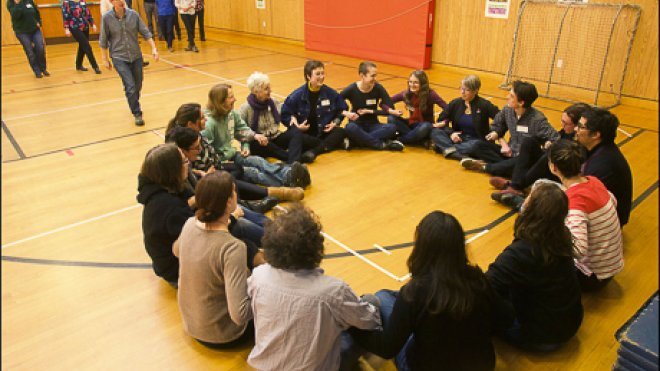RWU to Host Nonviolent Civil Disobedience Training on Feb 9
In order to empower students to create social change, RWU will host a nonviolent civil disobedience training as part of a series of activism education events.

BRISTOL, R.I. – On Saturday, Feb 9, Roger Williams University will host a nonviolent civil disobedience training to provide community members with tangible tools for dissent.
“Civil disobedience is a time-honored, effective method of bringing fierce, nonviolent pressure to bear on unjust systems,” says training co-facilitator, Alexis Danzig of Rise and Resist, a direct-action organization in New York City that formed after the 2016 election.
The upcoming training is part of a series of activism education events created in response to student desire for learning how to create change in their communities.
The series began with a protest teach-in this fall, led by RWU faculty members and staff, which offered participants historical context for student-led protest on various social justice issues.
Among the presenters was Gabby Porcaro, Assistant Director for Queer and Trans Initiatives.
“After attending a conference last February with some of my students, where we got to participate in an abridged version of this CD (civil disobedience) training, I knew I wanted to bring Danzig and colleague BC Craig to campus,” says Porcaro. “So, I worked to make my fall teach-in programming based around understanding local agencies that support queer and trans communities with the goal of hosting this training in the Spring.”
While the teach-in provided necessary information for standing up for queer and trans rights and the rights of other marginalized communities, February’s training will provide techniques for participating in civil disobedience, a tactic of direct action. This work aims to give students a sense of power in the face of injustice.
Alexis Danzig learned these techniques herself as a young adult, soon after her father died of AIDS. Not only was she grieving the loss of her loved one, but she also realized that many other people were getting sick and dying of AIDS, and nobody was taking notice.
Soon after, in 1988, Danzig attended a civil disobedience training with ACT UP, one of the first and largest grass roots responses to the AIDS crisis. She participated in a demonstration where ACT UP affinity groups formed specific messages about AIDS-related issues like homelessness, unemployment, and the need for medications. They made requests to the Food and Drug Administration (FDA), the government agency that, at the time, controlled access to the few promising AIDS drugs that existed.
Danzig reflects, “It emboldened me to take my grief and anger and turn it into something that was positive and could help create change.”
By participating in direct action, she was inspired to encourage others to challenge authority when necessary. Soon after the action at the FDA, she began helping to run trainings that enabled people of all abilities work together to develop messages and fight injustice with direct action.
Porcaro thinks the RWU community will benefit greatly from this work, especially at this moment in history.
“Alexis' training is poignant considering what is currently happening in our country,” she says. “I want my students to be engaged and active citizens. I want my students to understand the power they have to change political systems of violence and oppression. And, I believe this CD training can help prepare them with some of the mobilization skills they might call upon.”
Participants in the Civil Disobedience Training can expect in-depth exploration of the following questions:
- What are some of the many different forms of direct action?
- When and where might civil disobedience be a useful tactic of direct action?
- What are useful ways to talk about violence and nonviolence?
- What is the role of affinity groups to use direct action to make change?
- How is consensus-based decision-making a useful tool for affinity groups, and how do we use it?
- What is likely to happen during an arrest procedure for nonviolent civil disobedience?
- How do we protect and support each other during civil disobedience?
Danzig hopes to bring people a sense of agency and concrete ways to work together to make change.
To those who attend, she says, “you’ll be a slightly different person afterwards.”
The Civil Disobedience Training will take place on Saturday, Feb 9, from 10:30 a.m. to 3:30 p.m. in the Campus Recreation Center Fitness Room B. Registration is required; contact Porcaro at gporcaro@rwu.edu to register.